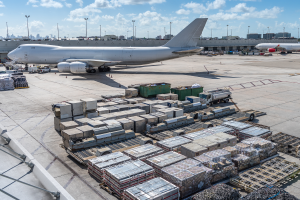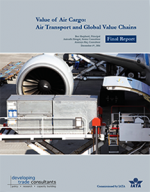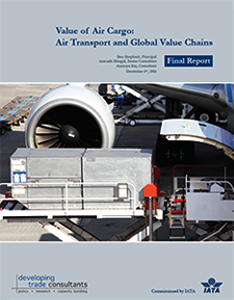Value of Air Cargo: Air Transport and Global Value Chains
The findings in this report can serve as evidence in support of policy deliberations on improving the trade facilitation environment and helping countries integrate into Global Value Chains, it highlights that countries with well-developed air cargo connections combined with good quality customs services and smart borders, are better at integrating into Global Value Chains.
Global trade has played a key role in fostering economic development and making countries more competitive and productive – thus supporting income growth and poverty reduction.
As a share of global output, trade is now at about three times the level it was in the early 1950s. In 2015, airlines transported 52.2 million metric tons of goods valued at USD 5.6 trillion.
Air cargo is key in supporting the current global trading system, with an estimated 35% of value of global trade carried by air, even though it covers less than 1% by volume.
The role of air cargo is even greater for trade in advanced industrial, high value goods, and other sectors that rely on rapid, reliable and secure transport.
The increase in trade has mostly been driven by noncommodity exports, made possible by trade liberalization and subsequent distribution of production processes beyond national borders.
The latest estimates from the World Trade Organization indicate that Global Value Chain trade has grown faster than trade overall - increasing its share from 36% in 1995 to 49% in 2011.
That means about half of global trade now takes place as part of Global Value Chains.
From an economic policy perspective, it is critical to better understand the factors that enable countries, particularly developing ones, to join Global Value Chains, and move up to higher value added activities.
The area remains relatively under-researched.
To enhance knowledge in this field IATA designed a research project that combined aviation, border management and trade expertise with the aim of shedding light on the role played by air cargo in supporting integration into the global trading system.
As part of this research project, IATA commissioned Developing Trade Consultants to undertake this study that, for the first time, quantifies the relationship between air cargo connectivity and participation in global trade.
As part of the study, two air cargo specific indices – the Air Trade Facilitation Index (ATFI) and eFreight Friendliness Index (EFFI) – were developed to assess effectiveness of smart border regulation, customs services and logistics chain.
This report also examined the challenges and opportunities of integrating into Global Value Chains across six case studies of specific sectors in six countries.
What’s Related


Favorites





